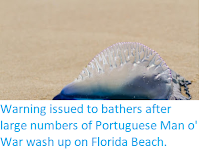More than fifty people, including several children, have been stung by Portuguese Man o' War, Physalia physalis, on beaches around the city of Mumbai in Maharashtra State, India, this week, with a number requiring hospital treatment as a consequence. Many city residents have been visiting the beaches in the past few days, as Monsoon rains have begun to ease up in the area, but this has brought them into contact with the venomous Cnidarians, which have proliferated off the coast in the recent hot weather.
Portuguese Man o' War are colonial Siphonophores only distantly related
to true Jellyfish, Scyphozoa, though commonly referred to as such. Their
bodies are made up of thousands of individual zooids, each with their
own sting, tentacles and digestive system. New zooids are formed by
budding from other members of the colony, but remain attached to these
to form a single colony. Each year a generation of specialist sexual
zooids (gonozoids) is produced which produce eggs and sperm, with
fertilised eggs going on to form new colonies. These animals are
anchored to the sea surface by a highly modified zooid which forms an
air sack, filled with a mixture of carbon monoxide defused from the
zooid and nitrogen, oxygen and argon from the atmosphere, which are
brought into the sack through osmosis. Portuguese Man o' War produce an
extremely strong venom, for both capturing food and defending the
colony, and which is capable of causing extremely painful stings, and
sometimes death, in Humans, for which reason people are advised to be
extremely cautious on beaches where these animals wash up, not just of
entire animals but also detached tentacles, which are less visible but
still capable of stinging.
See also...
Follow Sciency Thoughts on
Facebook.







